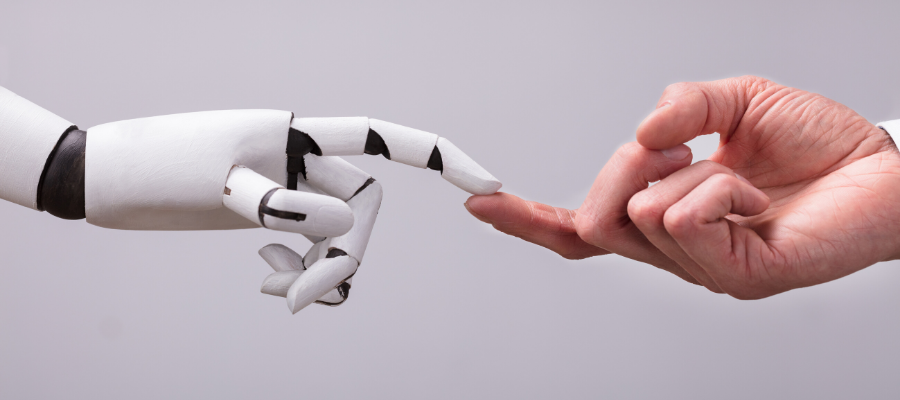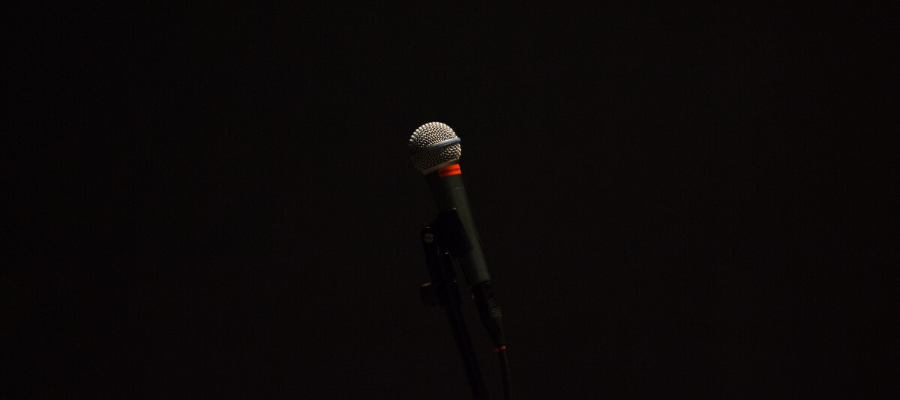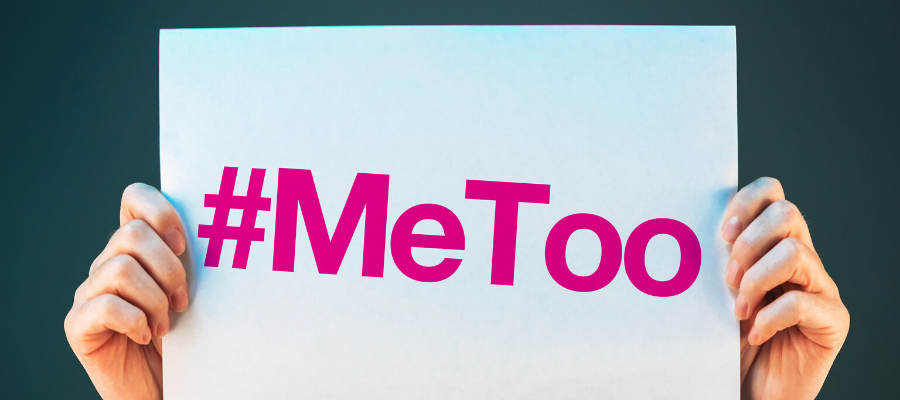Transhumanism
18
Jul 2017
One part philosophy, two parts futurist—this is the essence of Transhumanism. A far-out movement that began in the 1990s and has steadily grown thanks to social media, Transhumanism is centered on the ethos that “the human species in its current form does not represent the end of our development but rather a comparatively early phase.” Transhumanists are made up of technologists, futurists, and life-extensionists who seek to use science and technology to improve the human condition. Zoltan Istvan, a leader in the Transhumanist movement, wrote that their...
Read moreArt and Obscenity
11
Mar 2017
The topic of this week’s show is Art and Obscenity. Specifically, we’re thinking about where art and obscenity intersect. So, what exactly do we mean by “obscene”? The Supreme Court defines it as any material which "appeals to a prurient interest in sex, portrays sexual conduct in a patently offensive way," and which "does not have any serious literary, artistic, political, or scientific value." Taken at face value, then, art—by definition—could never be obscene, and that would be the end of our discussion! Given that the Supreme Court has also declared corporations to...
Read moreOn Being a Wife
03
Apr 2010
What is a wife? From a philosophical point of view, it looks like the word `wife’ is a predicate and so should stand for a condition, presumably one that humans meet or don't meet at times. And so the first question is, which condition? And then the next questions would be about the importance of the property, its relation to issues of equality, social structure and the like. But the first question isn’t so simple. When we read Marilyn Yalom’s book, A History of the Wife, it seems pretty clear that the word `wife’ (and the words in other languages...
Read moreMorality and the Self
29
Sep 2011
Our topic this week is Morality and the Self. Now most people think of themselves as pretty decent types, maybe not saints, but they tell themselves they're willing to do the right thing most of the time. But if you examine how people actually behave in various situations, situations that put their moral characters to the test, we don’t actually measure up to our own-self assessments. Social psychologists have long known that our evaluations of other people are suspect in certain ways. More recently, they've uncovered surprising and provocative results...
Read moreWhy I am not a Wittgensteinian
03
Mar 2007
Today's episode is about Wittgenstein. Our guest will be Juliet Floyd. Many regard Wittgenstein as perhaps the greatest philosopher of the 20th century. I don't share that view. But there's no denying that, for a man who published only one book during his lifetime -- a book that he later basically repudiated -- he really did have a tremendous impact on 20th century analytic philosophy. Indeed, Wittgenstein has to be regarded as one of the great founding fathers of 20th century analytic philosophy, especially of the so-called linguistic turn in philosophy. Now I don't profess at all to be...
Read moreAnti-Semitism 101
07
Nov 2018
Last week a middle-aged man named Robert Bowers walked into the Tree of Life synagogue in Pittsburgh and murdered eleven people. Just days afterwards, a Jewish cemetery in Rochester, New York, was vandalized and the words “Kill Jews” were found scrawled on the walls of a Brooklyn synagogue. Since then, the news cycle has been awash with discussions of anti-Semitism, but there’s something peculiar about the way that it often gets described by our politicians and pundits. The problem is exemplified by Kellyanne Conway’s comment, on the Fox News channel’s Fox and Friends program, that...
Read moreReal Horror
30
Oct 2019
October 31st is the day when we revel in all things creepy. Children roam the streets, seeking treats, undeterred by leering, demonic-looking Jack-o’-lanterns, plastic skeletons, and other pieces of Halloween paraphernalia. And later on, when the stream of trick-or-treaters has dried up, and the kids are tucked away in bed, the adults might celebrate by sitting down to watch a horror movie. Horror movies aren’t the same as scary movies. The plots of scary movies are riddled with physical danger. Silence of the Lambs is unquestionably a scary movie, but it’s not a horror movie. Fear morphs...
Read moreLethal Speech
19
Dec 2017
“Can Speech Kill?” was the title question to last week’s fascinating show with Lynne Tirrell. The obvious answer, it seems, should be: yes, but not directly. Unless magic exists, uttering a few words won’t by itself cause someone to drop dead. But there are two kinds of case where talking can obviously cause death and even be counted as murderous. First—as one caller pointed out—is that of giving an order. If someone orders a subordinate to murder and the subordinate does, then the superior has committed murder as well. Second—which wasn’t discussed on the show—one can help...
Read morePuppet Philosophers
25
Jun 2018
The puppets of Sesame Street and The Muppet Show should step aside — a new puppet show is in town. Featuring Noam Chomsky, Elon Musk, Karl Marx, and Ayn Rand as rod puppets, Manufacturing Mischief (a riff on Chomsky's Manufacturing Consent) premiered in April at MIT, Chomsky's "longtime intellectual home." According to The New York Times, the eccentric play involves a technology contest, an apparatus called the Print-a-Friend and "a surprise appearance by Donald Trump." As part of the play, its characters debate the nature of technology,...
Read moreClimate as a Collective Action Problem
30
Sep 2022
This week we’re thinking about Collective Action and Climate Change. With floods and fires getting more frequent and intense, and with the summer just ended shattering heat records around the globe, we clearly need to do something about climate change. And fast. And indeed, many of us have done something, like putting solar panels on our homes, replacing our lights with LEDs, even switching to an electric car. (One of the Philosophy Talk hosts may have done just that.) But are those individual actions really enough? If only some of us do that, while others do nothing, we’ll...
Read moreA Nietzschean Defense of Ben Carson
08
Nov 2015
How much difference does it make whether Ben Carson stretched the truth about his life story? Not much, I think. Before you dismiss me as a “right-wing nut job,” let me state for the record that I am a lifelong Democrat (whose biggest political dilemma at the moment is whether to vote for Hilary or Bernie). But as a professional philosopher (which I also am) I’m not convinced that what we have learned so far about Carson’s life story disqualifies him for the Presidency. Let’s start with what is probably one of the more minor issues. In his autobiography, Gifted Hands, Carson...
Read moreMohan's Question
30
Mar 2005
During the call-in component of the show, Mohan asked a question about the relationship between political freedom and metaphysical freedom. Although it was a bit off the central topics, it does raise a question that has troubled me. That is, I believe that genuinely available metaphysical alternatives or possibilities are not required for moral agency--the forward-looking aspect (practical reasoning) or the backward-looking aspect (moral responsibility). But then why would I prefer to live in a nation with political liberties, such as freedom of speech, freedom of...
Read moreWhat are Crony Beliefs?
14
Mar 2017
According to Kevin Simler's essay called "Crony Beliefs," crony beliefs are beliefs that you have partly because you want to believe them. This article talks at length about how beliefs form and when things go wrong. Why does it seem like so many people end up believing things that end up serving their self-interest? In a political context, I'm sure it would be easy to find boatloads of evidence for this on both sides of the aisle. However, taking a step back, some philosophers doubt that such a thing as "crony beliefs" could even exist. They argue as follows: if the...
Read moreNozick, Libertarianism, and Philosophy
10
May 2017
In this Aeon article, historian Brad Baranowski highlights two of Robert Nozick's most important contributions to philosophy: first, his libertarianism; and then, his vision for what analytic philosophy could be—not as technical and obscurant. Nozick wrote perhaps his most famous book, Anarchy, State, and Utopia, in 1974 as a reply to Rawls' 1971 classic, A Theory of Justice. On the one hand, what are the merits of a libertarian, small-government way of looking at things? On the other, why did Nozick himself move away from libertarianism as his views on...
Read moreShould You Fear AI?
19
Sep 2017
AI takeover—the hypothetical event wherein computers or robots take over the world and obliterate humankind—is a common trope in science fiction books and apocalyptic movies. But is superintelligent AI really something we should fear? In this TEDTalk, scientist and philosopher Grady Booch thinks not. While movies like The Matrix, Metropolis, and The Terminator exacerbate humans' fears of being supplanted by technology—that is, that we might develop technology that is much too advanced for own good—we forget, in Booch's view, an important point....
Read moreReading, Narrative, and the Self
26
Nov 2010
This week’s topic is Reading, Narrative, and the Self. I suppose everybody has a pretty good idea of what each of those things, taken individually, means. Reading is something that most people do. A good narrative -- or story, to use a less fancy term -- is something most people enjoy. And a self is something everybody has. But I think I need to explain what reading, narrative, and the self have to do with each other. I’ll take them in reverse order, starting with the self. Everybody has a self...
Read more'Anybody Need a Kidney?' or 'What Are the Moral Limits of Markets?'
18
Apr 2013
I'm in the process of looking for work. In the meantime, I'm a bit low on cash. A friend of mine recently joked that I could always sell a kidney. Well, I'm not that desperate (yet), but the fact remains that I can't sell a kidney, at least not legally. This got me thinking: should I be able to do so? Most people have intuitions about what it's okay and what it's not okay to do for money. Harvard philosopher Michael Sandel has articulated some of those intuitions in What Money Can't Buy: The Moral Limits of Markets. Although I haven't read the book, I know he takes up the issue of...
Read moreWelcome Valley Public Radio Listeners
09
Dec 2008
We at Philosophy Talk are really pleased to begin airing on Valley Public Radio, covering Fresno, Bakersfield, and California's Central Valley, beginning Thursday December 11th at 7pm. We're really excited about the opportunity to engage with you all about life, love, culture, science, religion and the whole range of topics we cover on our show. Before we before we actually began to air on Valley Public Radio, we had an opportunity to appear live in front of audience from the Central Valley. Just over a year ago we took the show on the road to...
Read morePhilanthropy vs. Democracy
29
Apr 2019
This week we’re asking whether philanthropy is bad for democracy—which is more than a little ironic. Philanthropy pays both of our salaries. It funds scholarships for needy students. It builds libraries, hospitals, and museums. So what’s not (for us) to like? For starters, we shouldn't let those good things blind us to the corrosive harm that philanthropy does—especially to democracy. Ask yourself why we need to bribe rich people into giving their money away, using tax breaks—and I mean huge tax breaks. All that does is reduce the overall funds government has to spend on all the...
Read moreMoney Matters
27
Apr 2020
Is money the root of all evil, or is it just a technology that makes our lives more efficient? Should some things not be for sale? This week on Philosophy Talk, we’ll be discussing money: where it comes from, what it is now, and what it could become in the future. You might think that something counts as money just in case it’s a valuable commodity that everybody is willing to barter for. Some forms of money, like gold coins, certainly fit this description. Others, like deeds that entitle the bearer to gold, are valuable because they represent valuable commodities. But it’s common...
Read moreMisogyny and Gender Inequality
23
Feb 2018
This week we’re thinking about misogyny and gender inequality. All over the world, men enjoy power and privilege relative to women. It’s always been that way, and probably always will be. But one could also have more hope, given that in some countries women have made a lot of progress. A hundred years ago, women in the US couldn’t vote. Now you find women occupying positions at the very top of the social hierarchy. There are women CEOs, women scientists, women lawyers, women senators. Then again, one might also think the #MeToo movement shows how far we still have to go. Women are still...
Read moreCracking Down on Disinformation
14
May 2021
In a world of disinformation, can anyone make informed political decisions? With all the anti-vaxxers, Q-Anon devotees, and 9-11 truthers out there, how out of touch can we get? Can we ever come together as a nation if we can’t even agree on what’s true? This week, we’re thinking about Disinformation and the Future of Democracy. Unless we do a better job of cracking down on disinformation, democracy is in danger. You might think that democracy just means that everybody gets a vote, but it’s about more than that: it means that everyone gets to make meaningful decisions about who runs things...
Read moreShakespeare's Anti-Heroes?
12
Apr 2024
In Shakespeare’s plays, characters like Othello, Shylock, and Caliban are often more interesting than the heroes. But Shakespeare can also be really unfair to those characters: Othello is violent and jealous, Shylock is vengeful and greedy, Caliban is primitive and mean—they basically come off as racist stereotypes. That said, audiences also have a lot of empathy for those characters—there’s a reason they’re so iconic. After all, how many people remember Henry VI? He’s totally boring! But being memorable isn't the same as being sympathetic. None of us would want to be remembered as...
Read moreExtreme Altruism
03
Apr 2016
Altruists are people willing to do good things for others at a cost to their own happiness and well-being. Some people think that humans are by nature completely self-interested. Self-interest is the very opposite of altruism. But in fact most of us have at least a touch of altruism in us. Think of the parent who sacrifices her own well being for the sake of her child. Think of the soldier who gives up the comforts of home and hearth to fight in some distant dessert. They're driven by altruism, not by naked self-interest. Some evolutionary...
Read moreWhen Democracies Torture
21
Apr 2015
Philosophical discussions about torture tend to focus on two things: whether torture is ever morally justified, and, if so, whether this should be reflected in the law. Such discussion tend to focus on extreme cases: torture the terrorist or let the bomb go off and injure hundreds or thousands of innocents. Sam Harris, in his essay “In Defense of Torture,” called these “ticking bomb” cases. Imagine the bomber sitting in your custody, gloating about the imminent explosion and the magnitude of human suffering it'll cause. Harris thinks that torturing this unpleasant fellow would be justified....
Read more





















